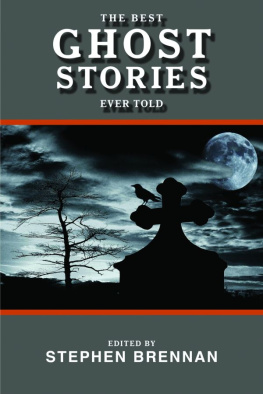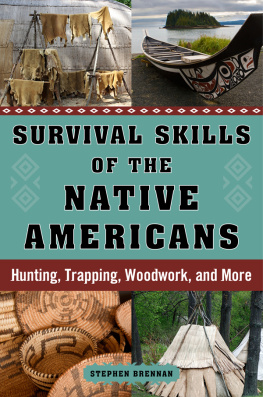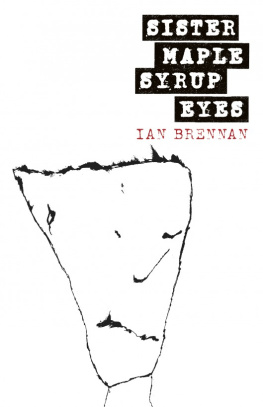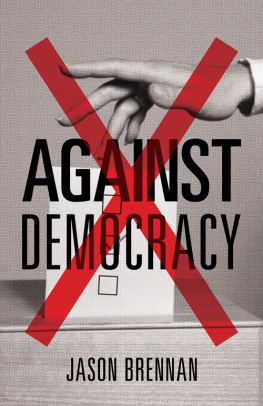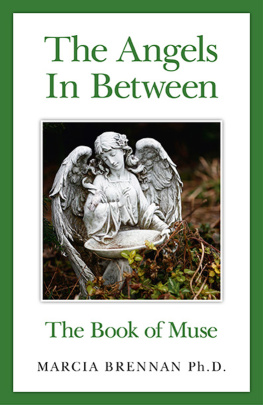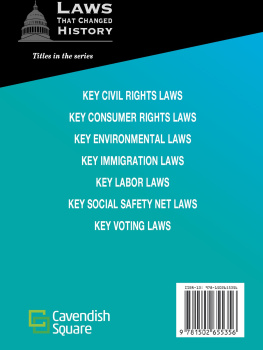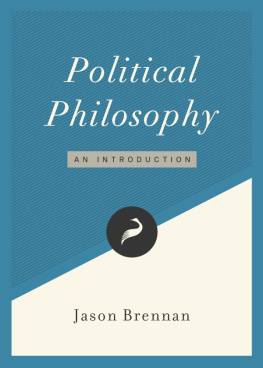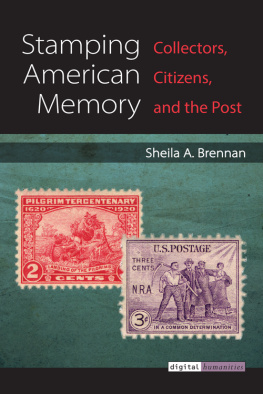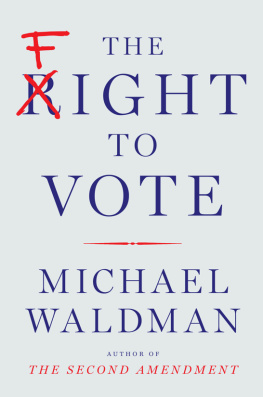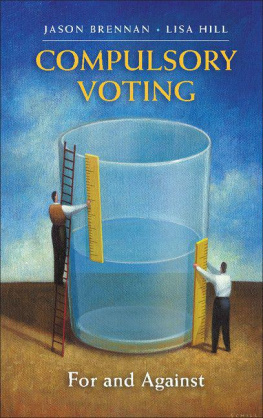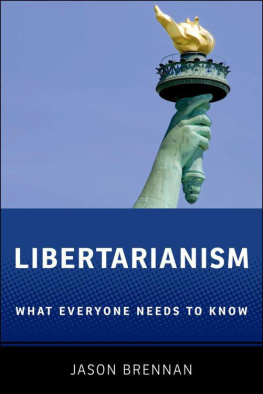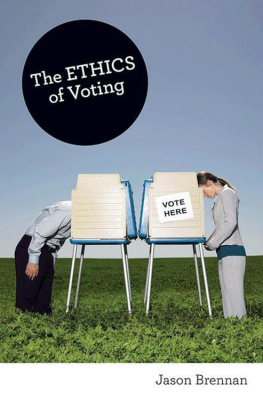Brennan - The Ethics of Voting
Here you can read online Brennan - The Ethics of Voting full text of the book (entire story) in english for free. Download pdf and epub, get meaning, cover and reviews about this ebook. City: Princeton, year: 2017;2011, publisher: Princeton University Press, genre: Politics. Description of the work, (preface) as well as reviews are available. Best literature library LitArk.com created for fans of good reading and offers a wide selection of genres:
Romance novel
Science fiction
Adventure
Detective
Science
History
Home and family
Prose
Art
Politics
Computer
Non-fiction
Religion
Business
Children
Humor
Choose a favorite category and find really read worthwhile books. Enjoy immersion in the world of imagination, feel the emotions of the characters or learn something new for yourself, make an fascinating discovery.

The Ethics of Voting: summary, description and annotation
We offer to read an annotation, description, summary or preface (depends on what the author of the book "The Ethics of Voting" wrote himself). If you haven't found the necessary information about the book — write in the comments, we will try to find it.
The Ethics of Voting — read online for free the complete book (whole text) full work
Below is the text of the book, divided by pages. System saving the place of the last page read, allows you to conveniently read the book "The Ethics of Voting" online for free, without having to search again every time where you left off. Put a bookmark, and you can go to the page where you finished reading at any time.
Font size:
Interval:
Bookmark:
The Ethics of Voting
Jason Brennan
With a new afterword by the author

Copyright 2011 by Princeton University Press
Published by Princeton University Press, 41 William Street, Princeton, New Jersey 08540
In the United Kingdom: Princeton University Press, 6 Oxford Street, Woodstock,
Oxfordshire OX20 1TW
press.princeton.edu
Cover photograph: Man and woman at voting booths in a cropfield. Photographer: Andy Reynolds/Getty Images.
All Rights Reserved
Second printing, and first paperback printing, with a new afterword, 2012
Paperback ISBN 978-0-691-15444-2
The Library of Congress has cataloged the cloth edition of this book as follows
Brennan, Jason.
The ethics of voting / Jason Brennan.
p. cm.(Voting as an ethical issueArguments for a duty to voteCivic virtue without politicsWrongful votingDeference and abstentionFor the common goodBuying and selling votesHow well do voters behave?)
Includes bibliographical references and index.
ISBN 978-0-691-14481-8 (hardcover : alk. paper) 1. VotingMoral and ethical aspects. I. Title.
JF1001.B742 2011
172.1dc22 2010047879
British Library Cataloging-in-Publication Data is available
This book has been composed in Sabon
Printed on acid-free paper.
Printed in the United States of America
10 9 8 7 6 5 4 3 2
To Lauren and Aiden
INTRODUCTION
Voting as an Ethical Issue
CHAPTER ONE
Arguments for a Duty to Vote
CHAPTER TWO
Civic Virtue without Politics
CHAPTER THREE
Wrongful Voting
CHAPTER FOUR
Deference and Abstention
CHAPTER FIVE
For the Common Good
CHAPTER SIX
Buying and Selling Votes
CHAPTER SEVEN
How Well Do Voters Behave?
AFTERWORD TO THE PAPERBACK EDITION
How to Vote Well
BROWN UNIVERSITY is a dynamic and exciting place to do political philosophy. I have benefited enormously from discussions with David Estlund and Charles Larmore in philosophy, and John Tomasi, Corey Brettschneider, and Sharon Krause in political science. John in particular was instrumental in my coming to Brown, so I owe him thanks for bringing and keeping me here. John and Dave have done much to mentor me and help me develop as a professional. I have also benefited from discussions and exchanges with, and criticisms from, the excellent postdoctoral research fellows we have been fortunate to host: Sahar Ahktar, Barbara Buckinx, Yvonne Chui, Mark Koyama, Hlne Landemore, Emily Nacol, Dennis Rasmussen, Andrew Volmert, and Daniel Wewers. In addition, graduate students Sean Aas, Daniel Berntson, Derek Bowman, Dana Howard, Jennifer Ikuta, Jed Silverstein, Timothy Syme, and Joshua Tropp helped to shape this book. Thanks are also due to Mark Gladis, Thomas Lewis, and Mark Suchman. For inviting me to speak on some of the issues presented in this book, I thank the undergraduates at the Janus Forum and Philosophy Undergraduate Club.
My colleagues generously held a workshop devoted to my manuscript. The commentators at the workshopRichard Arneson, Julia Driver, and David Estlundgave me highly valuable feedback. I have long been a fan of Dicks and Julias work, and it was an honor to have them provide comments, criticisms, and encouragement for mine. Corey organized the conference, Dina Egge took care of the logistics, and Corey, John, and Sharon chaired sessions. Thanks go to them and also to everyone who attended.
I thank Bryan Caplan for his book The Myth of the Rational Voter. I have been fascinated by the logic and ethics of collective action for a long time, but if I had not read Caplan, I never would have written this book.
During the summers of 2008 and 2009, I had the opportunity to lecture on some of these ideas before large interdisciplinary groups of graduate students as part of The Social Change Workshop, sponsored by The Institute for Humane Studies, George Mason University. I thank Jonathan Fortier for inviting me to participate.
Will Wilkinson, who hosts Free Will, a philosophy talk show, on Bloggingheads.tv, discussed morally mandatory abstention with me shortly after my Polluting the Polls article was accepted for publication. I am pretty sure I would not have written this book had I never discussed the topic with Will. Thanks also to reporters at the Guardian and Radio Netherlands.
A number of other people have helped me by commenting on drafts or previous articles, asking questions at professional presentations, or simply by discussing these issues: Julia Annas, Neera Badhwar, Geoffrey Brennan, Elizabeth Busch, Sam Clark, Tom Christiano, Ross Corbett, Richard Dagger, Ryan Davis, Christopher Freiman, Michael Fuerstein, Gerry Gaus, Robert Goodin, Paul Gowder, Robert Gressis, Andrew Lister, Loren Lomasky, Aaron Maltais, Steven Maloney, Simon Cabulea May, Christian Rostbll, Ben Saunders, David Schmidtz, Rebecca Stangl, Kyle Swan, Christine Swanton, Kevin Vallier, Matt Zwolinski, and audience members at the American Philosophical Association, the University of Arizona, the New England Political Science Association, and the Midwest Political Science Association. I also thank Rob Tempio, my editor, for his interest and encouragement. Dave Schmidtz has been a fabulous mentor over the years, and I owe him much gratitude as well. Josiah S. Carberry also offered significant (unsolicited) advice, all of which I ignored.
Finally, thanks are due to my mom and dad for showing me how to have a good work ethic and to my partner Lauren and son Aiden for bringing me so much joy.
Most of this work is new, but there are pieces drawn from previously published work.
A portion of was published as Tuck on the Rationality of Voting, Journal of Ethics and Social Philosophy 3 (2009): 15.
Parts of are based on Polluting the Polls: When Citizens Should Not Vote, Australasian Journal of Philosophy 87 (2009): 53549.
The Ethics of Voting
WHEN WE VOTE, we can make government better or worse. In turn, our votes can make peoples lives better or worse.
If we make bad choices at the polls, we get racist, sexist, and homophobic laws. Economic opportunities vanish or fail to materialize. We fight unjust and unnecessary wars. We spend trillions on ill-conceived stimulus plans and entitlement programs that do little to stimulate economies or alleviate poverty. We fail to spend money on programs that would work better. We get overregulation in some places, underregulation in others, and lots of regulation whose sole effect is to secure unfair economic advantages for special interests. We inflict and perpetuate injustice. We leave the poor behind. We wage drug wars that ghettoize inner cities. We throw too many people in jail. We base our immigration and trade policies on xenophobia and defunct economic theories.
Voting is morally significant. Voting changes the quality, scope, and kind of government. The way we vote can help or harm people. Electoral outcomes can be harmful or beneficial, just or unjust. They can exploit the minority for the benefit of the majority. They can do widespread harm with little benefit for anyone. So, in this book, I argue that we have moral obligations concerning how we should vote. Not just any vote is morally acceptable.
This is a book on voting ethics. In particular, it concerns the ethics of voting in political contexts. (It is not about voting for MLB All-Stars or American Idol contestants.) The purpose of this book is to determine whether a citizen should vote at all and how she should vote if she chooses to do so. The field of voting ethics asks questions such as: Should citizens choose to vote or abstain? If a person is indifferent to the outcome of an election, should she abstain? When citizens do vote, how should they vote? May voters use their religious beliefs in deciding how to vote? Must voters vote sincerely, for the candidate or position they believe best? What counts as voting for the best candidate? In particular, should voters vote solely for their own interest, or should they vote for the common good, whatever that is? Is it ever acceptable to buy, sell, or trade votes?
Next pageFont size:
Interval:
Bookmark:
Similar books «The Ethics of Voting»
Look at similar books to The Ethics of Voting. We have selected literature similar in name and meaning in the hope of providing readers with more options to find new, interesting, not yet read works.
Discussion, reviews of the book The Ethics of Voting and just readers' own opinions. Leave your comments, write what you think about the work, its meaning or the main characters. Specify what exactly you liked and what you didn't like, and why you think so.


